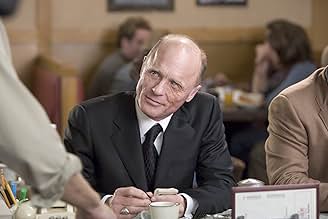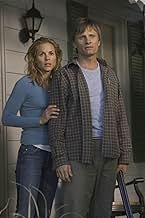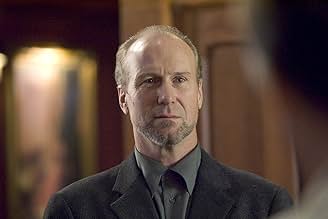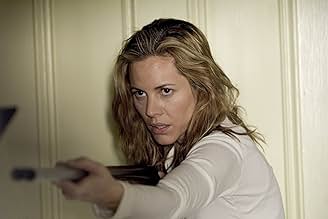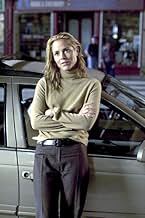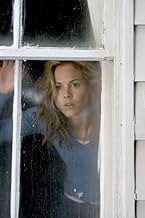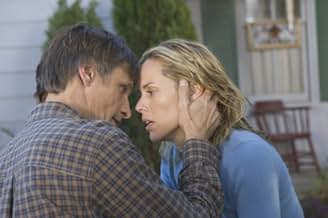Um homem torna-se um herói através de um ato de violência, que desencadeia repercussões na sua familia.Um homem torna-se um herói através de um ato de violência, que desencadeia repercussões na sua familia.Um homem torna-se um herói através de um ato de violência, que desencadeia repercussões na sua familia.
- Direção
- Roteiristas
- Artistas
- Indicado a 2 Oscars
- 37 vitórias e 84 indicações no total
- Direção
- Roteiristas
- Elenco e equipe completos
- Produção, bilheteria e muito mais no IMDbPro
Avaliações em destaque
I expected bloody senselessness and instead saw a film laden with the deepest human emotions. It was real. From youthful loving to hard violence, from simple innocent joys to the full depth of adult violence and sex, and ultimate redemption, this film has it all. Every piece of clothing and set, every camera angle and lighting propelled the story relentlessly. I was never bored, and never overwhelmed with overdone violence. Nothing was gratuitous. Viggo Mortensen proved he's one of the finest actors to come along in a long while. Maria Bello carries so much on her talented shoulders. With Mortensen she shines with alternately warming and heartbreaking truthfulness. Ed Harris was delightfully menacing, and William Hurt gave the liveliest and best performance I've seen from him.
This movie is about truth and redemption. It's the best film I've seen in a very long time. Kudos to Cronenberg, Mortensen, Bello, and all the cast and crew for what was for me a nearly perfect movie.
See it, then see it again. It's brilliant.
This movie is about truth and redemption. It's the best film I've seen in a very long time. Kudos to Cronenberg, Mortensen, Bello, and all the cast and crew for what was for me a nearly perfect movie.
See it, then see it again. It's brilliant.
Cronenberg's adaptation of a Wagner and Locke graphic novel places a simple American family man, and his all-American family, into a new and disturbing context which has them questioning everything they think they know. Tom Stall (Viggo Mortensen) owns a little diner in a small town and has a nice house on the outskirts of town, where he and his wife Edie (Maria Bello) raise their two kids apparently living the American dream in their own way. One day at the diner, two murderers pop by at closing time for some cherry pie, and Tom's heroic defense of his diner, his customers and himself sets off a series of events that threaten his family, his sanity and his life. The eerie tension never lets up in this powerful examination of identity, honesty and violence.
David Cronenberg has directed some of my favorite off-beat films - the masterpiece Naked Lunch, Scanners, Videodrome. I have watched these films many times and I still find them interesting. I can't really call myself a fan, however, because there are also just as many Cronenberg films out there which I found difficult to get through the first time (Crash, eXistenZ, Dead Ringers). Cronenberg enjoys creating disturbing situations and imagery, and wants to get under your skin and to stimulate your mind on as many levels as he can. In most cases, he pulls it off masterfully, but sometimes, his emphasis on the bizarre can come across as pretentious and forced.
Like a lot of very creative and intelligent people, Cronenberg sometimes leaves his signature virtually everywhere in his work. And sometimes, a director needs to make a film which does everything they want to accomplish but leaves off the signature. For example - the brilliant David Lynch showed us his ability to jump out of his own skin with Elephant Man and The Straight Story. These are still very much Lynch films, but they also appeal to the wider audience of mainstream cinema-goers. A History of Violence is, in some ways, Cronenberg's most straightforward film. A key to its success is that it is very easy to forget that you are watching a Cronenberg film, no matter how aware you are of Cronenberg's many quirks, idiosyncrasies and trademarks. It is so masterfully directed that, although the plot is not entirely unpredictable, you are right there in the action with the characters and feeling what they feel so that, though you may know what's next, you never exactly see it coming and you never know how it will take you there.
Viggo Mortensen, in his best mainstream role since Aragorn, and Maria Bello (one of the actors who made The Cooler worth watching), head an impressive cast in this adaptation of a Wagner and Locke graphic novel. Nobody in the cast slips up at all. The script is intense, realistic, and probably did nothing to make the performances easy. The plot, if described without the plot and the context created by the script, would seem somewhat absurd, but like Woody Allen's Match Point, it's absurdity does not make it impossible to believe. Editing, directing and pure performance combine to make flawless performances for this cast. Backed up by veterans Ed Harris and William Hurt, and very strongly supported by the excellent Maria Bello, Mortensen is shockingly excellent in a difficult role. I can't explain why without giving too much of the film away. Although the rest of the cast did exactly as they were supposed to, I want to single out Ashton Holmes - an actor I was completely unfamiliar with but who I will look out for in the future.
I recommend A History of Violence highly. It is one of my top five reasons for considering 2005 to have been a great year in North American film.
David Cronenberg has directed some of my favorite off-beat films - the masterpiece Naked Lunch, Scanners, Videodrome. I have watched these films many times and I still find them interesting. I can't really call myself a fan, however, because there are also just as many Cronenberg films out there which I found difficult to get through the first time (Crash, eXistenZ, Dead Ringers). Cronenberg enjoys creating disturbing situations and imagery, and wants to get under your skin and to stimulate your mind on as many levels as he can. In most cases, he pulls it off masterfully, but sometimes, his emphasis on the bizarre can come across as pretentious and forced.
Like a lot of very creative and intelligent people, Cronenberg sometimes leaves his signature virtually everywhere in his work. And sometimes, a director needs to make a film which does everything they want to accomplish but leaves off the signature. For example - the brilliant David Lynch showed us his ability to jump out of his own skin with Elephant Man and The Straight Story. These are still very much Lynch films, but they also appeal to the wider audience of mainstream cinema-goers. A History of Violence is, in some ways, Cronenberg's most straightforward film. A key to its success is that it is very easy to forget that you are watching a Cronenberg film, no matter how aware you are of Cronenberg's many quirks, idiosyncrasies and trademarks. It is so masterfully directed that, although the plot is not entirely unpredictable, you are right there in the action with the characters and feeling what they feel so that, though you may know what's next, you never exactly see it coming and you never know how it will take you there.
Viggo Mortensen, in his best mainstream role since Aragorn, and Maria Bello (one of the actors who made The Cooler worth watching), head an impressive cast in this adaptation of a Wagner and Locke graphic novel. Nobody in the cast slips up at all. The script is intense, realistic, and probably did nothing to make the performances easy. The plot, if described without the plot and the context created by the script, would seem somewhat absurd, but like Woody Allen's Match Point, it's absurdity does not make it impossible to believe. Editing, directing and pure performance combine to make flawless performances for this cast. Backed up by veterans Ed Harris and William Hurt, and very strongly supported by the excellent Maria Bello, Mortensen is shockingly excellent in a difficult role. I can't explain why without giving too much of the film away. Although the rest of the cast did exactly as they were supposed to, I want to single out Ashton Holmes - an actor I was completely unfamiliar with but who I will look out for in the future.
I recommend A History of Violence highly. It is one of my top five reasons for considering 2005 to have been a great year in North American film.
In the first fifteen minutes of "A History of Violence," we get a small town diner, a baseball game, and a sneering, varsity letter-wearing high school bully. Throw in an apple pie on a window sill and some kids saying bedtime prayers, and you've got the Saturday Evening Post. But this is the work of David Cronenberg, whose films so often explore the blurry – and icky – lines between biology and technology. So it's not surprising when this film, too, heads for the gray areas, this time between the sensibilities of Rockwell and Tarantino.
Small town diner owner Tom Stalls (Viggo Mortenson) runs the kind of place where you can eat at the counter, and "see you in church" is a standard goodbye. When he single-handedly foils a robbery and saves a few lives, then, the townsfolk are impressed and grateful, but not all that surprised. Tom is a Man, after all, and that's what Men do. But as David Lynch has taught us, pastoral postcard America often conceals deep weirdness and violence. The diner incident is of course big news in Anytown, USA, and Tom finds himself attracting not only local reporters who want to know "how it felt," but also the Reservoir Dog-type Mr. Foggerty (Ed Harris), who isn't surprised that Tom knows his way around a gun, and waxes nostalgic about good times in Philadelphia involving barbed wire and a guy named Joey Cusack. Foggerty seems to think Tom knows exactly what he's talking about.
Tom as "local hero" his family can handle, but after the Foggerty matter comes to a head, they do begin to wonder where these moves that would make Jeff Speakman proud are coming from. Perhaps more unsettling is the fact that they unconsciously sort of get off on their new image of dad. Junior soon finds in himself the will to flatten his jock tormentor, and wife Edie (Maria Bello) with some gusto acts out a rough rape fantasy with her hubby. Tom Stalls, indeed, but can't prevent the inevitable truth from coming to light nor catching up with him. That's shocking enough to his family, though maybe less so than the ways that knowledge affects them.
"A History of Violence" is fond of feinting toward familiar territory, only to veer away. Just when we think we've seen if before, in "Natural Born Killers," "Cape Fear," and the "just when I think I'm out, they pull me back in" tropes of countless mob flicks, it shifts its focus. For all its brutality, it comes across as a quiet movie. There is indeed more to Tom than he lets on, but less than his detractors might believe. He may be a liar in the strictest sense, but his protestations to his family and persecutors are sincere. The contemplation of violence, both pre and post-facto, rather than the acts themselves, drive the film. Whether the capability for, and indeed commission of, such acts permanently defines a person is left for us to decide. The film ends ensconced once again in small town tranquility, though this time seething with unspoken fear, accusations, and uncertainty. "A History of Violence" doesn't force itself with preaching or moralizing, but simply unfolds. It's another solid offering from the strong career of David Cronenberg.
Small town diner owner Tom Stalls (Viggo Mortenson) runs the kind of place where you can eat at the counter, and "see you in church" is a standard goodbye. When he single-handedly foils a robbery and saves a few lives, then, the townsfolk are impressed and grateful, but not all that surprised. Tom is a Man, after all, and that's what Men do. But as David Lynch has taught us, pastoral postcard America often conceals deep weirdness and violence. The diner incident is of course big news in Anytown, USA, and Tom finds himself attracting not only local reporters who want to know "how it felt," but also the Reservoir Dog-type Mr. Foggerty (Ed Harris), who isn't surprised that Tom knows his way around a gun, and waxes nostalgic about good times in Philadelphia involving barbed wire and a guy named Joey Cusack. Foggerty seems to think Tom knows exactly what he's talking about.
Tom as "local hero" his family can handle, but after the Foggerty matter comes to a head, they do begin to wonder where these moves that would make Jeff Speakman proud are coming from. Perhaps more unsettling is the fact that they unconsciously sort of get off on their new image of dad. Junior soon finds in himself the will to flatten his jock tormentor, and wife Edie (Maria Bello) with some gusto acts out a rough rape fantasy with her hubby. Tom Stalls, indeed, but can't prevent the inevitable truth from coming to light nor catching up with him. That's shocking enough to his family, though maybe less so than the ways that knowledge affects them.
"A History of Violence" is fond of feinting toward familiar territory, only to veer away. Just when we think we've seen if before, in "Natural Born Killers," "Cape Fear," and the "just when I think I'm out, they pull me back in" tropes of countless mob flicks, it shifts its focus. For all its brutality, it comes across as a quiet movie. There is indeed more to Tom than he lets on, but less than his detractors might believe. He may be a liar in the strictest sense, but his protestations to his family and persecutors are sincere. The contemplation of violence, both pre and post-facto, rather than the acts themselves, drive the film. Whether the capability for, and indeed commission of, such acts permanently defines a person is left for us to decide. The film ends ensconced once again in small town tranquility, though this time seething with unspoken fear, accusations, and uncertainty. "A History of Violence" doesn't force itself with preaching or moralizing, but simply unfolds. It's another solid offering from the strong career of David Cronenberg.
Let's start by writing this is a film I have difficulty evaluating. You notice the great technical qualities but emotionally it leaves you conflicted. Which, considering this is a Cronenberg film, might just be what was intended. I've seen most of his films and "A history of violence" is probably the least weird and most "commercial" (a term used by the director himself). It's a psychological drama with of course certain sequences of violence. It would not qualify as an action flick because the fight scenes are quite quick (less than a minute mostly), realistic, harsh and not glamorized. They're rather shocking but somehow exhilarating (like an adrenaline rush) but linger just a bit to show the results and make you feel uncomfortable. In the end, it does make you think about violence, if it's something ingrained, how it affects people, if it can sometimes be justified and if it can be overcome.
Let's not forget a very interesting mystery aspect regarding the past of the main character played solidly and subtly by Viggo Mortensen. All the actors were quite convincing in their parts, the wife being suitably loving and tormented, the main gangsters being suitably menacing. They felt like real characters and I particularly liked the interactions between the wife and husband. Cronenberg is obviously a professional at his craft and shows it once again. It's cinema d'auteur as we would say in french but it's not boring or overtly intellectual. So if you're a Cronenberg fan, this is obviously a must-buy but expect it to be relatively more "tame" than his previous efforts. If you like smart character driven psychological dramas with a hint of mystery, it's a must see but I'm conflicted as to how re-watchable it is, making a purchase recommendation an uncertain thing. Fans of the Cohen brothers dramas/thrillers would probably like it also.
Rating: 7.5 out of 10
Let's not forget a very interesting mystery aspect regarding the past of the main character played solidly and subtly by Viggo Mortensen. All the actors were quite convincing in their parts, the wife being suitably loving and tormented, the main gangsters being suitably menacing. They felt like real characters and I particularly liked the interactions between the wife and husband. Cronenberg is obviously a professional at his craft and shows it once again. It's cinema d'auteur as we would say in french but it's not boring or overtly intellectual. So if you're a Cronenberg fan, this is obviously a must-buy but expect it to be relatively more "tame" than his previous efforts. If you like smart character driven psychological dramas with a hint of mystery, it's a must see but I'm conflicted as to how re-watchable it is, making a purchase recommendation an uncertain thing. Fans of the Cohen brothers dramas/thrillers would probably like it also.
Rating: 7.5 out of 10
10gsygsy
This is, like all Cronenberg's work, a mythic movie. It occupies the world of "monsters" that Tom Stall's daughter dreams about at the start. It's as if we get to see the little girl's nightmare as the film unfolds. It's because of this poetic, super-real quality that criticisms from the "this isn't real life" brigade have no relevance. The screenplay is exceptionally tight and well-woven - no image is wasted. The subplot of the son's troubles with a school bully parallels the main plot. The very existence of the son is there to show the inheritance - the history - of violence. The sex scenes are there to show the proximity of lust and violence. The end can be nothing other than what it is: as someone else on IMDb has commented, the genie is out of the bottle. This is true for the family in the film, the society we see surrounding the family, and it's true for our families and our society. It's about the inexhaustible rage of humans. It couldn't be more relevant, it couldn't be more timeless. It is well acted and beautifully photographed. I have some minor reservations - did we really need so much of Howard Shore's music? - but on the whole I think this is a superb film. Not for the kiddies, however.
Você sabia?
- CuriosidadesWilliam Hurt received an Oscar nomination for this film for Best Supporting Actor despite only being in one scene which lasted less than 10 minutes.
- Erros de gravação(at around 1h 4 mins) When Sam the Sheriff comes to the house for the second time (after the second batch of killings), he parks diagonally at the beginning of the driveway, essentially blocking the entrance to the driveway. He and Tom go into the house to talk, and while they are talking, Edie pulls into the garage, parks and comes into the house. She could not have pulled into the garage with the Sheriff's car blocking the driveway.
- Citações
[last lines]
Richie Cusack: [Joey holds a gun to Richie's head] Jesus, Joey.
Tom Stall: [as Joey shoots Richie in the head, then stands over his dead body] Jesus, Richie.
- Versões alternativasThere are some minute differences between the US and the International version when it comes to some of the violent scenes:
- Fogarty's thug, who gets his nose smashed into his skull has more blood spurt out in the International version in the shot where he is dying on the ground.
- When Joey stomps on Richie's thug's throat, he spits blood (instead of it 'welling up') and the sound effect of the neck breaking is louder. Both shots last the same length of time and use the same take, the amount of blood was simply toned down digitally for the MPAA. Most video versions outside the U.S. use the 'international version' but the shots appear in the supplements on the U.S. DVD (In the featurette titled 'Violence's History', Cronenberg shows the U.S. and international cut scenes side by side and explains the reason why there wasn't a standard 'unrated' version in the U.S. was because the changes were so small).
- ConexõesEdited into A History of Violence: Deleted Scene - Scene 44 (2006)
Principais escolhas
Faça login para avaliar e ver a lista de recomendações personalizadas
- How long is A History of Violence?Fornecido pela Alexa
- Is 'A History of Violence' based on a book?
- Does Tom suffer from MPD? Because at times, he looks and sounds like he really believes his own lies when he vehemently denies being the person Joey Cusack.
- What's the deal with the second sex scene? It seemed random and out of place.
Detalhes
- Data de lançamento
- Países de origem
- Central de atendimento oficial
- Idioma
- Também conhecido como
- Una historia violenta
- Locações de filme
- Empresas de produção
- Consulte mais créditos da empresa na IMDbPro
Bilheteria
- Orçamento
- US$ 32.000.000 (estimativa)
- Faturamento bruto nos EUA e Canadá
- US$ 31.504.633
- Fim de semana de estreia nos EUA e Canadá
- US$ 364.000
- 25 de set. de 2005
- Faturamento bruto mundial
- US$ 61.385.065
- Tempo de duração1 hora 36 minutos
- Cor
- Mixagem de som
- Proporção
- 1.85 : 1
Contribua para esta página
Sugerir uma alteração ou adicionar conteúdo ausente







